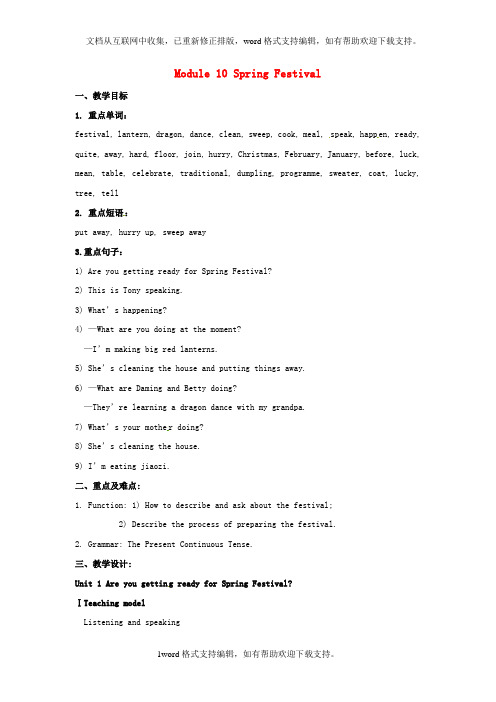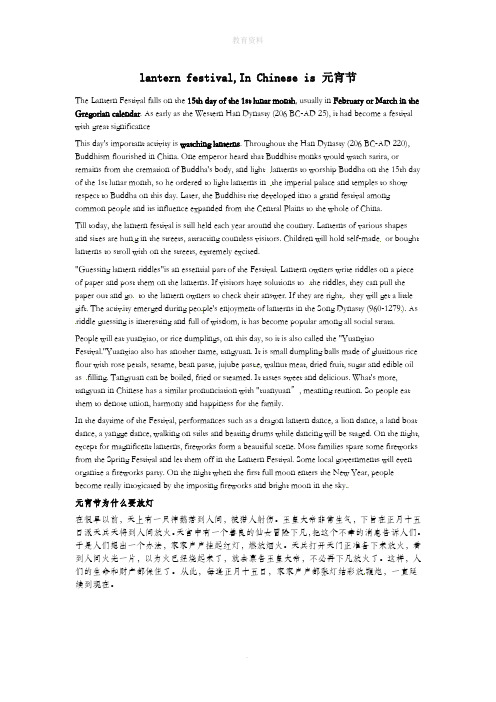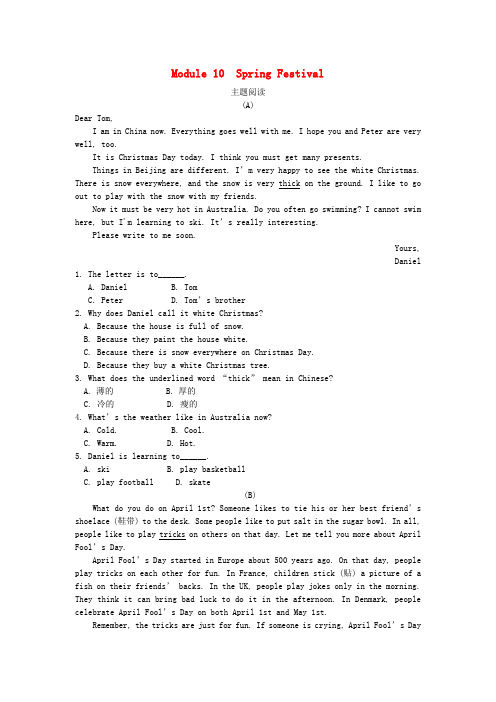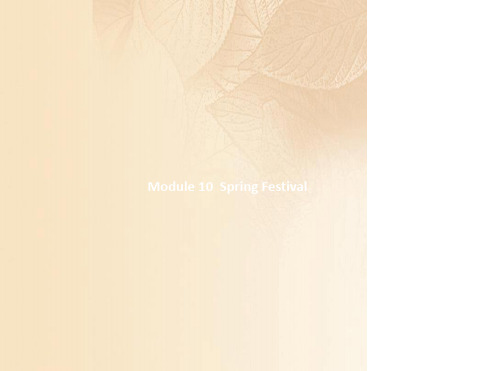2016年秋七年级英语上册 Module 10 Spring Festival Unit 3 Language in use素材
外研版英语(新标准)七年级上册Module 10 Spring Festival模块知识点归纳总结

Module 10 Spring FestivalAre you getting ready for SpringFestival?必背单词1.dance(v.)跳舞→dancing(现在分词)2.clean(v.)打扫→cleaning(现在分词)3.meal(n.)一餐;一顿饭→meals(pl.)4.happen(v.)发生→take place(同义短语)5.quite(adv.)十分,相当→very(同义词)6.hurry(v.)赶快,匆忙→hurries(第三人称单数形式) 7.lantern(n.)灯笼8.dragon(n.)龙9.sweep(v.)打扫;清扫10.floor(n.)地板11.cook(v.)烹调;煮;烧12.speak(v.)说话,讲话13.festival(n.)节日14.beautiful(adj.)漂亮的,美丽的15.away(adv.)在安全的地方;在通常存放的地方16.hard(adv.)努力地;(adj.)艰难的,困难的17.join(v.)参加;加入必背短语18.get ready for为……做好准备19.at the moment此刻,目前20.at work在工作21.put away收起,收拾好22.hurry up赶快必背句子23.This is Tony speaking.我是托尼。
24.I'm making big red lanterns.我在做大红灯笼。
25.She's working so hard!她正如此努力地干活!26.Can I join them?我可以加入他们吗?My mother's cleaning our houseandsweeping away bad luck.必背单词1.before(prep.)在……之前→after(反义词)在……之后2.luck(n.)运气→lucky(adj.)幸运的→luckily(adv.)幸运地3.celebrate(v.)庆祝→celebration(n.)庆祝4.traditional(adj.)传统的→tradition(n.)传统5.Christmas(n.)圣诞节6.merry(adj.)愉快的,高兴的7.February(n.)二月8.January(n.)一月9.table(n.)桌子10.dumpling(n.)饺子,团子11.programme(n.)(电视)节目12.sweater(n.)厚运动衫;毛线衣13.coat(n.)外套14.mean(v.)意思是;意味着必背短语15.sweep away扫去16.Spring Festival春节17.a kind of一种18.bad luck坏运;霉运必背句子19.It usually comes in February, but sometimes it comes in January.它通常是在二月份,但有时在一月。
七年级英语上册Module10SpringFestivalUnit1Areyougettingrea

Module 10 Spring Festival一、教学目标1. 重点单词:festival, lantern, dragon, dance, clean, sweep, cook, meal, speak, happ en, ready, quite, away, hard, floor, join, hurry, Christmas, February, January, before, luck, mean, table, celebrate, traditional, dumpling, programme, sweater, coat, lucky, tree, tell2. 重点短语:put away, hurry up, sweep away3.重点句子:1) Are you getting ready for Spring Festival?2) This is Tony speaking.3) What’s happening?4) —What are you doing at the moment?—I’m making big red lanterns.5) She’s cleaning the house and putting things away.6) —What are Daming and Betty doing?—They’re learning a dragon dance with my grandpa.7) What’s your mothe r doing?8) She’s cleaning the house.9) I’m eating jiaozi.二、重点及难点:1. Function: 1) How to describe and ask about the festival;2) Describe the process of preparing the festival.2. Grammar: The Present Continuous Tense.三、教学设计:Unit 1 Are you gettin g ready for Spring Festival?ⅠTeaching modelListening and speakingⅡTeaching methodInteractive approachⅢTeaching aims1. To understand the conversation about the Spring Festival;2. To recognize phrases and recognize short answers in the listening;3. To talk about the Spring Festival with given information.ⅣTeaching Objectives1. Key vocabulary:festival, lantern, dragon, dance, clean, sweep, cook, meal, speak, happen, ready, quite, away, put away, hard, floor, join, hurry, hurry up2. Key structures:1) Are you getting ready for Spring Festival?2) This is Tony speaking.3) What’s happenin g?4) —What are you doing at the moment?—I’m making big red lanterns.5) She’s cleaning the house and putting things away.6) —What a re Daming and Betty doing?—They’re learning a dragon dance with my grandpa.ⅤTea ching aidsTape recorder, OHP, video, a clockⅥTeaching StepsStep 1 Warming-up1. Show some pictures of birthday and say what they are.2. Match the words with the pictures.3. Read the words after the teacher.4. Introduce the new words.Step 2 Listening practice.1. Ask the students to read the phrases in Activity 1.2. Match the pictures with the expressions.3. Play the recording through once while they just listen.4. Ask the students to listen to the recording.5. Play the recording again, then number the pictures.6. Call back the answer from the whole class and check the answer.Step 3 Listen and read.1. Ask the students to read the conversation silently.2. Play the recording and ask the students to listen and read the conve rsation.3. Read the conversation.4. Act it out.5. Choose the correct answer in Activity 3.6. Call back the answer from the whole class and check the answer.Keys: 1.Yes, they are. 2. No. they aren’t. 3. No. she isn’t.4. No. she isn’t.5. Yes, she is.6. Yes, he is.Step 4Answer the questions.1. Read the dialogue again.2. Ask the students to answer the questions..4. Play the recording again .Check the answers:Keys:1. She is making big red lanterns.2. Lingling’s father is working.3. She is sweeping the floor.4. She is cookin g the meal in the kitchen.5. They are learning a dragon dance with Lingling’s grandpa.Step 5 Comple te the passage with the correct form of the words and expression from the box.1. Ask the students to read through the sentences.2. Complete the passage with the correct form of the words and expression from the box. with a partner.3. Call back the answer from the whole class and check the answer.Keys:1. happening2. ready3. hard4. putting things away5. quite6. lanterns7. dragon8. is hurrying9. is joiningStep 6 Listen and repeat.1. Play the recording once without stopping.2. Play the recording again and stop at the end of each line. Ask the whole class to repeat.3. Play the recording again and stop at the end of each line. Ask individual students to repeat.4. Ask the students to practice the sounds in pairs.Step 7 Work in pairs.1. Ask the students to look at the pictures in Activity 7.2. Go through the language.—Is the girl making lanterns?—Yes, she is/ No, she isn’t3. Work in pairs. Ask and answer about what people in the pictures are doing. Step 8 Do exercises:A. Translate these phrases into English.1. 打扫房间2. 扫地3. 做饭4. 制作灯笼5. 为……作准备6. 学舞龙7. 春节 8. 在工作 9. 此时Keys: 1. clean the house 2. sweep the floor 3. cook the meal 4. make lanterns 5. get ready for 6. learn a dragon dance 7. Spring Festival 8. at work 9. at the momentB. 单词拼写1. Today is the Spring ________(节日).2. Are you getting _____________(有准备的) for the test?3. The student is ___________(弄干净) his chair.4. I’m cooki ng a _________(一餐饭) myself.5. Are there any __________(龙) in the old picture?Keys: 1. Festival 2. ready 3. cleaning 4. meal 5. dragonsC. 完成句子:1. 他在为聚会作准备吗?____ he _______________ the party?2. — Tom在做灯笼吗?—是的。
七年级英语上册-Module-10-Spring-Festival-Unit-1-Are-you-g

课堂导学
如: (5)Lily is helping me __(_to_)_m_a_k_e_______ lanterns. 莉莉正在帮助我制作灯笼。 (6)My sister often helps _m_e_(_t_o_)s_t_u_d.y English 我姐姐经常帮助我学习英/语m。e with English
• 5. 参加;加h入a_p_p__e_n_______ 动词 • 6. 慌忙;赶快____________
join
hurry
副词
• •
1. 2.
十在分安;全相地当方;__在__通__常_q_存_u_i放_t_e地方____________
away
5/61
课前预习
形容词
• •
1. 2.
有漂准亮备;好漂;亮准__备__好__________________r_e_ady
Betty doing?
dance.
Where’s Lingling’s In the 5. _k_i_tc_h_e_n___.
grandma?
37/61
课文了解
三、依据书本Act.3对话,完成以下短文填空。 What’s happening at Lingling’s home?They
are getting 1. _r_e_a_d_y____ for Spring Festival. They’re 2. _q_u_it_e_____busy at the moment. Lingling is making big red lanterns by herself. Her father is still working.
23/61
课堂导学
七年级英语上册Module10SpringFestivalanternfestival,InChineseis课外延伸素材(新版)外研版

教育资料lantern festival,In Chinese is 元宵节The Lantern Festival falls on the 15th day of the 1st lunar month, usually in February or March in the Gregorian calendar. As early as the Western Han Dynasty (206 BC-AD 25), it had become a festival with great significanceThis day's important activity is watching lanterns. Throughout the Han Dynasty (206 BC-AD 220), Buddhism flourished in China. One emperor heard that Buddhist monks would watch sarira, or remains from the cremation of Buddha's body, and light lanterns to worship Buddha on the 15th day of the 1st lunar month, so he ordered to light lanterns in the imperial palace and temples to show respect to Buddha on this day. Later, the Buddhist rite developed into a grand festival among common people and its influence expanded from the Central Plains to the whole of China.Till today, the lantern festival is still held each year around the country. Lanterns of various shapes and sizes are hun g in the streets, attracting countless visitors. Children will hold self-made or bought lanterns to stroll with on the streets, extremely excited."Guessing lantern riddles"is an essential part of the Festival. Lantern owners write riddles on a piece of paper and post them on the lanterns. If visitors have solutions to the riddles, they can pull the paper out and go to the lantern owners to check their answer. If they are right,they will get a little gift. The activ ity emerged during peo ple's enjoyment of lanterns in the Song Dynasty (960-1279). As riddle guessing is interesting and full of wisdom, it has become popular among all social strata.People will eat yuanxiao, or rice dumplings, on this day, so it is also called the "Yuanxiao Festival."Yuanxiao also has another name, tangyuan. It is small dumpling balls made of glutinous rice flour with rose petals, sesame, bean paste, jujube past e, walnut meat, dried fruit, sugar and edible oil as filling. Tangyuan can be boiled, fried or steamed. It tastes sweet and delicious. What's more, tangyuan in Chinese has a similar pro nunciation with "tuanyuan”, meaning reunion. So people eat them to denote union, harmony and happiness for the family.In the daytime of the Festival, performances such as a dragon lantern dance, a lion dance, a land boat dance, a yangge dance, walking on stilts and beating drums while dancing will be staged. On the night, except for magnificent lanterns, fireworks form a beautiful scene. Most families spare some fireworks from the Spring Festival and let them off in the Lantern Festival. Some local governments will even organize a fireworks party. On the night when the first full moon enters the New Year, people become really intoxicated by the imposing fireworks and bright moon in the sky.元宵节为什么要放灯在很早以前,天上有一只神鹅落到人间,被猎人射伤。
七年级英语上册Module10SpringFestival主题阅读(附答案)

Module 10 Spring Festival主题阅读(A)Dear Tom,I am in China now. Everything goes well with me. I hope you and Peter are very well, too.It is Christmas Day today. I think you must get many presents.Things in Beijing are different. I’m very happy to see th e white Christmas. There is snow everywhere, and the snow is very thick on the ground. I like to go out to play with the snow with my friends.Now it must be very hot in Australia. Do you often go swimming? I cannot swim here, but I'm learning to ski. It’s really interesting.Please write to me soon.Yours,Daniel1. The letter is to______.A. DanielB. TomC. PeterD. Tom’s brother2. Why does Daniel call it white Christmas?A. Because the house is full of snow.B. Because they paint the house white.C. Because there is snow everywhere on Christmas Day.D. Because they buy a white Christmas tree.3. What does the underlined word “thick” mean in Chinese?A.薄的B.厚的C. 冷的D. 瘦的4. What’s the weather like in Australia now?A. Cold.B. Cool.C. Warm.D. Hot.5. Daniel is learning to______.A. skiB. play basketballC. play footballD. skate(B)What do you do on April 1st? Someone likes to tie his or h er best friend’s shoelace (鞋带) to the desk. Some people like to put salt in the sugar bowl. In all, people like to play tricks on others on that day. Let me tell you more about April Fool’s Day.April Fool’s Day started in Europe about 500 years ago. On th at day, people play tricks on each other for fun. In France, children stick (贴) a picture of a fish on their friends’ backs. In the UK, people play jokes only in the morning. They think it can bring bad luck to do it in the afternoon. In Denmark, people ce lebrate April Fool’s Day on both April 1st and May 1st.Remember, the tricks are just for fun. If someone is crying, April Fool’s Dayisn’t fun.1. What does the underlined word “tricks” mean in Chinese?A. 游戏B. 树枝C. 花招D. 方法2. Which of the following tricks is NOT mentioned in the passage?A. Tie his or her best friend’s shoelace to the desk.B. Put salt in the sugar bowl.C. Stick a picture of a fish on their friends’ backs.D. Draw a fish on their friends’ desks.3. In______, people play jokes only in the morning.A. FranceB. the UKC. DenmarkD. the US4. Which of the following is TRUE according to the passage?A. April Fool’s Day started in Asia about 500 years ago.B. In the UK, people think playing jokes in the morning can bring bad luck.C. In Denmark, people celebrate April Fool’s Day on April 1st and May 1st.D. The tricks are terrible and they always make people cry.5. What’s the main idea of the passage?A. It’s about April Fool’s Day.B. It’s about some ways to celebrate May 1st.C. It’s about some ways to make friends with others.D. It’s about some special days for fun.(C)用所给动词的适当形式填空。
七年级英语上册Module10SpringFestivalUnit1Areyougettingrea

Please put them away. 请把它们收起来。
1.1.b 2.a 3.c 4.c 5.d 3.1.Yes, they are. 2.No, they aren ' t. 3.No, she isn ' t. 4.No, she isn ' t. 5.Yes, she is. 6.Yes, he is. 4.1.She is making big red lanterns. 2.Lingling ' s father is working. 3.She is sweeping the floor. 4.She is cooking the meal. 5.They' re learning a dragon dance. 5.(1)happening (2)ready (3)hard (4)putting things away (5)quite (6)lanterns (7)dragon (8)is hurryinspeak动词,意为“说话 ;讲话”,speak主要有如下用法 : (1)speak+ 某种语言 ,表示“讲某种语言”。 I can' t speak Chinese. 我不会说汉语。 (2)speak to sb. 对某人说。 He is speaking to Uncle Wang. 他在同王叔叔讲话。
3.Are you getting ready for Spring Festival?(教材P60)你们正在 为春节做准备吗 ?
[解读] 此句中 get ready for 意为“为 ……做准备” ,其中for为介 词,后接名词或 v.-ing形式。ready作形容词 ,意为“准备好的”。
外研版七年级英语上册Module 10 Spring Festival 知识点讲解

Module 10 Spring Festival1. Are you getting ready for the Spring Festival?你为春节做好准备了吗?get ready for做好准备动作You have an hour to get ready for the trip.Her mother says, ”Get ready.We have to leave.”be ready for 做好准备,表状态例如:I am ready for the meeting.我为会议做好了准备。
【拓展】Get ready to do sth. 准备做某事。
如:They are getting ready to visit China.他们正准备访问中国。
【Practice】1) Many sportsmen are getting ready ______ the 2020Olympic Games.A. toB. withC. forD. on解析:C。
Get ready for为固定短语,意为“为……准备好”。
2) 完成句子,每空一词。
现在让我们准备去睡觉。
Now, let’s ________ _______ ________ bed.(Keys: get ready for)2. What are Daming and Betty doing?本句为现在进行时的特殊疑问句,其构成为“特殊疑问句+ be (am / is /are) +主语+ 动词的-ing形式+其他?”,用于询问目前正在发生或进行的动作。
如:What’s Lily looking at?莉莉正在看什么呢?【Practice】1)—What are the teachers doing?—_________.A.He is watching TV.B.No, they are not.C.Yes, they are.D.They are teaching.解析:D.问句的主语表复数,且询问“老师们正在做什么”,故答语也应用现在进行时来回答。
秋外研版七年级上册module10《spring festival》优秀教案(重点资料).doc

Module 10 Spring FestivalUnit1 Are you getting for Sping Festival?Spring Festival, ready, getthe Spring FestivalTo talk about the Spring Festival with given structures --- What is LingLing doing?are very busy before the Spring Festival.Festival,Unit 2My mother’s cleaning our house and sweeping away bad luckdecorate, decoration, paper cut, everyone, haircut,Unit 3 Language in useUnit 4 Review and test(一)用所给动词的适当形式填空。
1. I_________(do) my homework now.2.She__________(lie) in the sun at the moment.3.Look! The boy_________(run).4. What is your mother doing?She___________(put) on her dress.5.______they________(have) a good time?Yes, they________.(二)按要求改写句子1.Tom is listening to the music. (划线提问)______ is listening to the music?2. She is cleaning the house. (划线提问) ______ ______ is ________?3. They are working. (划线提问) ______ ______ _______ _______?4.They are sleeping now. (划线提问) ______ are they sleeping ?5. People are drinking in the pub.(划线提问_)______ are People drinking ?(三)TranslateA. 1.节日2.地板3.有准备的4.帮助5.打扫;弄干净6.做饭;烹饪7.一餐,一顿饭8.学;学会9.龙10.发生(-ing)11.灯笼12.打扫13.舞龙14.扫去15.元宵节16.为…做准备17.春节18.在工作B.Fill in the blanks1 Everyone _________________(准备)Spring Festival.2. The boys ________________(学舞龙).Lingling___________(做灯笼).3. Lingling’s mother____________(打扫房间).4. Lingling’s aunt ____________(扫地).What’sLingling’s grandmother doing?5. She___________(做饭).____lingling’s father____(帮忙)?No, he isn’t.He _______(工作).(四)Complete the words.At Spring Festival, We p_____ doors and windows red. It means goodl______.We usually d___________ the doors and windows with paper cuts. On Spring Festival’s Eve the family has d__________ and we eat jiaozi--- a kind of d______________.The New Year Festival f________ at the L___________ Festival after t________ weeks.Our parents and grandparents usually give us new c_________ as New Year p___________.(五)WritingThink of a friend who you don’t often see. Write a postcard saying what you are doing at the Spring Festival.Dear_____________,How are you? I’m enjoying school very much. I’m learning English. __________________________________________________________________ __________________________________________________________________ __________________________________________________________________ __________________________________________________________________ __________________________________________________________________ _______________See you soon.Love_________。
- 1、下载文档前请自行甄别文档内容的完整性,平台不提供额外的编辑、内容补充、找答案等附加服务。
- 2、"仅部分预览"的文档,不可在线预览部分如存在完整性等问题,可反馈申请退款(可完整预览的文档不适用该条件!)。
- 3、如文档侵犯您的权益,请联系客服反馈,我们会尽快为您处理(人工客服工作时间:9:00-18:30)。
Module 10 Spring Festival
Unit 3 Language in use
图片导入
Show some pictures and let the students talk about the pictures in pairs.
—What is she doing?
—She is cooking.
…
教材Activities 1-4
1.Pair work:
学生两人一组,针对Activity 1,采用游戏的方式练习现在进行时。
2.Activity 2 的控制性比较强,旨在练习现在进行时的一般疑问句,先让学生自己完成,然后两人一组,核对答案并口头练习。
3.Activity 3 是Activity 1 的继续,考查现在进行时的特殊疑问句及其回答,让学生两人一组练习,然后分组展示。
4.Activity 4 是语法应用活动,是综合训练,要求用单词和短语的正确形式填空。
要求学生先个体活动,再小组讨论,最后全班核对答案。
拓展阅读教材Around the world
学生阅读时,教师根据文章提出几个问题:
1.Why do children like Christmas?
2.What colour is Father Christmas' suit?
3.What does Father Christmas look like?
[答案] 1.Because of Father Christmas.
2.Red.
3.He is a fat man with a long white beard and he wears a red suit.
通过设置问题来了解学生是否理解文章大意。
课后让学生通过上网或到图书馆查阅资料,了解西方国家的其他节日,并简单向全班做介绍。
如:
万圣节是西方国家的传统节日。
这一夜是一年中最“闹鬼”的一夜,所以也叫“鬼节”。
华语地区常将万圣夜误称为万圣节。
“Hallow”来源于中古英语halwen,与holy词源很接近,在苏格兰和加拿大某些区域,万圣节仍然被称为“All Hallow Mas”,意思是在纪念所有圣人(Hallow)的那一天,要举行的弥撒仪式(Mass)。
一起来看看与万圣节有关的关键词吧: October 31st, pumpkin lantern, dress up in costumes, go door to door, trick or treat…
What other Western festivals do you know?
这既锻炼学生的阅读能力,又扩展学生的视野,培养学生的跨文化交际意识。
更多备课资源:word版电子教案、匹配的课件,详见光盘内容。
